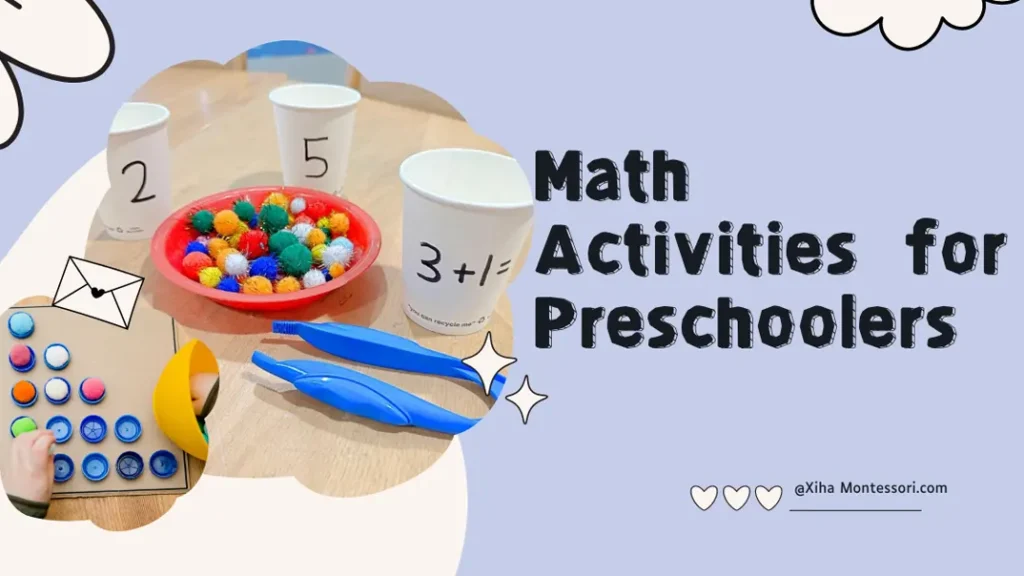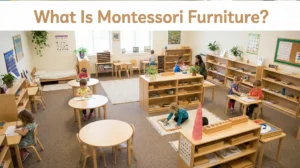Preschoolers are naturally curious and eager to learn, which makes now the perfect time to introduce them to the world of math. Engaging in fun and educational math activities for preschoolers can help your child develop basic math concepts and skills.
Preschool is the perfect time to start building a solid foundation in math. Through Math Activities for Preschoolers, children can develop important math skills such as number recognition, counting, and problem-solving. Incorporating these activities into your daily routine can help your child develop a love of math and prepare for success later in life.
Whether you are a parent, teacher or caregiver, these math activities can be easily implemented at home or in the classroom. Foster a love of math early and prepare your child for success in school and beyond.
What Math Concepts Should Preschoolers Learn?
At the preschool level, math is far less about memorizing formulas and far more about developing Number Sense. This is the intuitive understanding of how numbers work and relate to the physical world. Rather than focusing on abstract equations, preschoolers should engage with concrete concepts such as one-to-one correspondence, pattern recognition, and spatial reasoning. Mastery of these foundational pillars ensures that when children encounter formal arithmetic later on, they have a solid framework of logic and visualization to lean on.
- Number recognition and counting: Understanding numbers and counting objects in order
- One-to-one correspondence: Matching one number to one object while counting
- Comparing quantities: Recognizing more, less, and the same
- Shapes and spatial awareness: Identifying basic shapes and how they fit together
- Patterns and sequencing: Recognizing and continuing simple patterns
- Measurement and comparison: Exploring size, length, and weight using everyday objects
- Sorting and classifying: Grouping items by color, size, or shape
Best Math Activities for Preschoolers
Math activities for preschoolers make learning math fun, interactive and effective. These activities help develop basic math skills such as counting, sequencing, pattern recognition, and arithmetic. Here are some of the best math activities for preschoolers that blend fun with learning effectively:
Counting Math Activities for Preschoolers
Counting is a child’s first magical step into the world of numbers. By transforming simple objects into treasures and everyday moments into games, we help children see that numbers are not just symbols on a page but part of the rhythm of their lives.
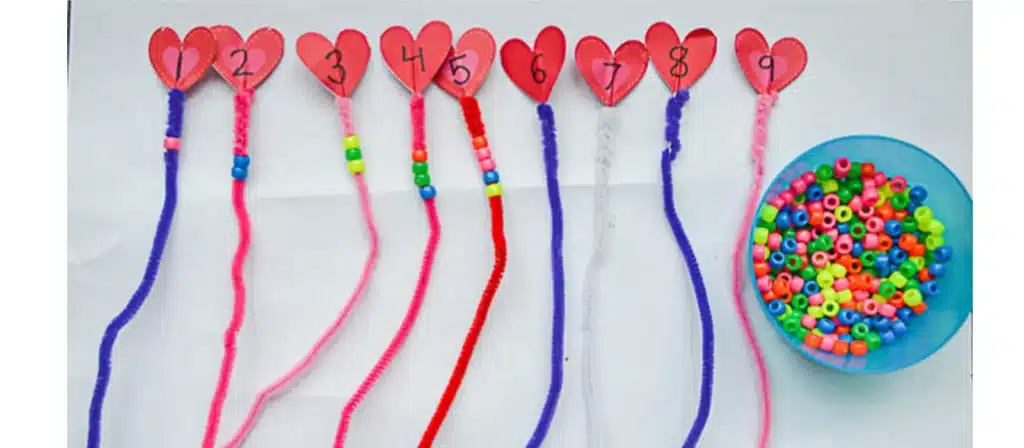
1. The Number Scavenger Hunt
Turn a simple walk into an adventure by asking your little explorer to find specific quantities of nature’s treasures. Whether it is three smooth stones or two yellow leaves, this math activity helps children connect spoken numbers to the physical objects in their hands.
2. Cookie Jar Counting
Invite your child to play “bakery” using felt circles as cookies and pom-poms as chocolate chips. As they carefully place each chip onto a cookie, they practice one-to-one correspondence in a way that feels like a sweet kitchen celebration.
3. Sticky Note Number Match
Place numbered sticky notes at eye level on a wall and have your child “decorate” each one with the matching number of stickers. This vertical play encourages fine motor skills while reinforcing the idea that a symbol represents a specific quantity.
4. Feed the Hungry Monster
Create a friendly “Number Monster” from a recycled box and let your child “feed” it a specific number of snacks, like blocks or pasta. Counting aloud while feeding the monster turns a basic math lesson into a playful story of friendship.
5. Puddle Jumping with Numbers
Lay numbered paper “puddles” across the floor and encourage your child to jump from one to the next. This high-energy math activity links the physical joy of movement to the sequence of counting, proving that math can be an active expression of play.
6. Counting with Beads
Bring a splash of color to math by using beads and strings to create counting jewelry. As children thread each bead to make a necklace or bracelet, they practice their counting sequence while simultaneously strengthening their fine motor skills.
7. Counting Songs and Rhymes
Music makes learning stick, so try incorporating counting songs like “Five Little Ducks” or “Ten in the Bed” into your daily routine. These rhythmic rhymes make the concept of counting both memorable and fun for young ears.
Shapes Math Activities for Preschoolers
When children identify the silhouette of a window or the roundness of a plate, they are engaging in sophisticated spatial reasoning and learning to categorize the world through a mathematical lens. By integrating these concepts into play, we transform abstract geometry into a tangible, sensory experience that sparks curiosity about how things are built.
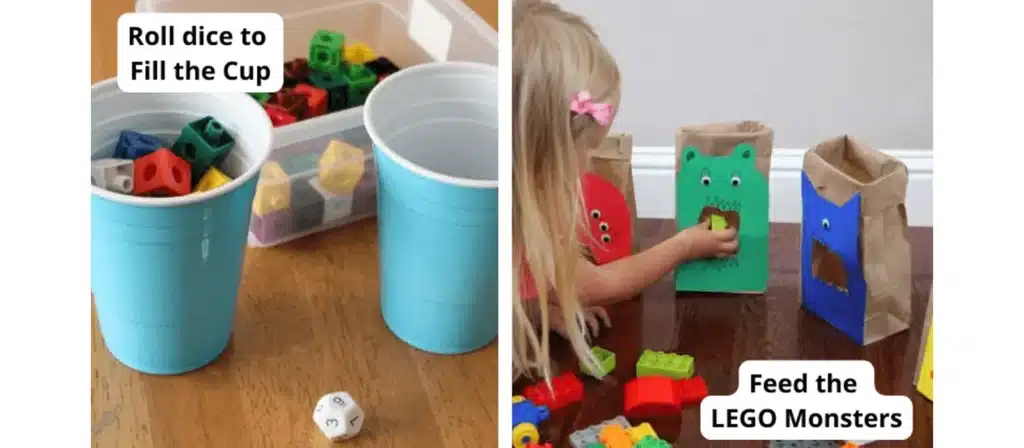
8. Shape Scavenger Hunt
Transform your home or classroom into a world of discovery by hunting for real-life shapes. Challenge your child to find a “circle” in a clock, a “rectangle” in a door, or a “square” in a picture frame. This activity helps children bridge the gap between classroom concepts and the environment around them.
9. Playdough Shape Building
Combine sensory play with geometry by using playdough and toothpicks or straws to build 2D and 3D structures. Creating a triangle out of three sticks or a cube out of dough balls allows children to feel the vertices and edges, making the properties of each shape tangible and easy to remember.
10. Salt Tray Shape Tracing
Fill a shallow tray with salt or colorful sand and invite your child to “draw” shapes with their fingers. This tactile activity provides immediate sensory feedback, helping them memorize the strokes needed to form different shapes while keeping the experience relaxing and playful.
11. Shape Sorting with Nature
Collect a variety of items from outdoors, such as round pebbles, triangular leaves, or rectangular bark pieces. Have your child sort these natural treasures into piles based on their geometric similarities. It is a wonderful way to show that math exists in the beautiful, organic patterns of nature.
12. Sticky Shape Art
Cut various shapes out of colorful tissue paper and have your child press them onto contact paper or a lightly glued surface to create a “stained glass” masterpiece. As they overlap circles and triangles to create new forms, they begin to understand how shapes can be composed and decomposed to create something entirely new.
Pattern Math Activities for Preschoolers
Identifying and creating sequences helps children uncover the predictable rhythms of the world around them. When a child notices the alternating colors on a sweater or the repetitive beat of a song, they are engaging in logical reasoning and preparing their minds for more complex algebraic thinking. These hands-on activities turn the study of patterns into a playful exploration of order and symmetry.
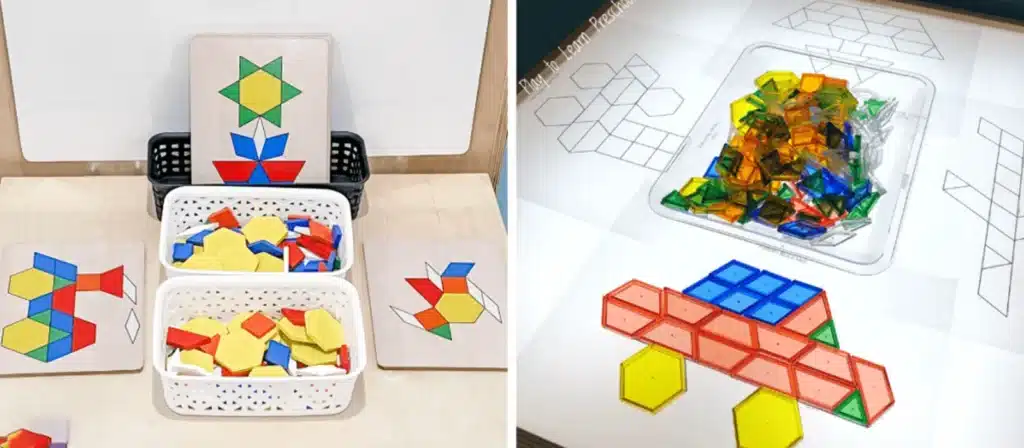
13. Pattern Block Masterpieces
There is a quiet magic in watching a child discover how colorful geometric shapes click together to create a larger design. By following a template or inventing their own “rule” for a sequence, they aren’t just playing; they are building the architectural foundations of their own logic. It’s a tactile way for them to see how individual parts create a beautiful, repeating whole.
14. The Story of the String: Bead Patterns
Handing a child a string and a bowl of beads is like giving them a pen to write a mathematical sentence. As they carefully choose a red bead, then a blue one, they are practicing focus and fine motor precision while mastering the art of the sequence. Watching their pride as they realize they’ve created a “necklace of rules” is one of the sweetest moments in any classroom or home.
15. Pattern Matching Games
Whether it’s a set of colorful cards on the rug or a playful interactive game, pattern matching turns brain exercise into a spirited celebration. These games challenge little ones to be “pattern detectives,” hunting for the missing link in a chain or predicting what comes next. It transforms a fundamental math skill into an exciting mission of discovery.
16. Edible Pattern Snakes
Snack time becomes a feast for the mind when fruit slices or cereal loops are lined up to form “pattern snakes.” As your child decides whether an orange or a grape comes next to keep the “snake” growing, they are visualizing mathematical laws in the most delicious way possible. It makes the concept of a repeating sequence feel tangible, rewarding, and deeply connected to their daily world.
17. Musical Echoes
Math doesn’t always have to be seen—it can be a rhythm felt in the heart. Try a “clap-tap-clap” pattern and invite your child to be your echo, mirroring the sequence back to you. This auditory play helps them internalize the concept of “rules” through their whole bodies, turning a simple moment of connection into a powerful lesson in sequences and symmetry.
18. Nature’s Hidden Patterns
Next time you’re outside, look for the math that grows in the wild. Gather a few stones and leaves to create a trail of patterns on the earth—two pebbles, one leaf, two pebbles. When a child bends down to place that final leaf in the correct spot, they aren’t just playing in the dirt; they are learning that the entire natural world is woven together with beautiful, predictable order.
Measurement Math Activities for Preschoolers
Before children ever pick up a ruler, they explore the world through the lens of size, weight, and volume. By comparing the treasures they find, they begin to understand the physical properties of objects and how they relate to one another. These math activities transform simple comparisons into a heartwarming journey of curiosity and discovery.
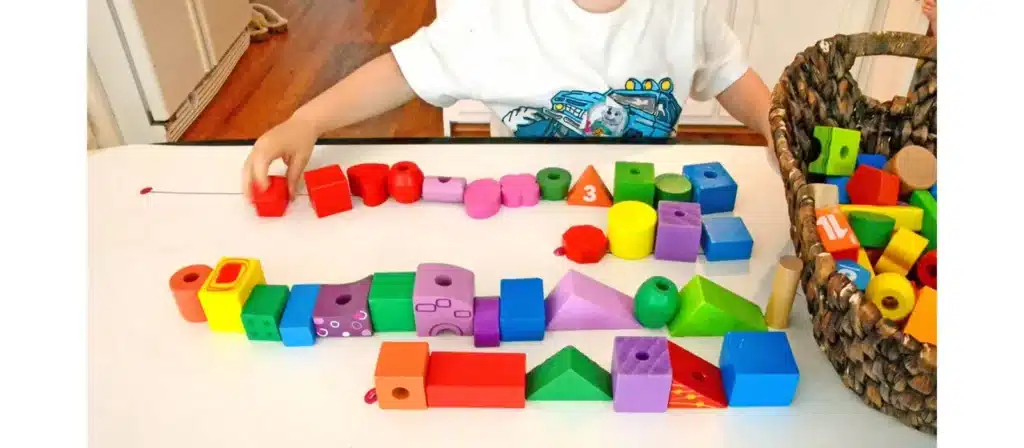
19. The “How Many Blocks High?” Challenge
Instead of using inches, invite your little builder to use wooden blocks to measure the height of their favorite stuffed animals. Watching a child carefully stack blocks to see that a teddy bear is “five blocks tall” is a joy to behold. This activity teaches that measurement is a way to describe space, all while building focus and steady hands.
20. Kitchen Science: Pouring and Filling
Turn a simple plastic bin into a laboratory of wonder by providing various cups, spoons, and containers for water play. Children delight in guessing how many small scoops it takes to fill a “giant” bowl, sparking an early love for scientific inquiry. It is a magical moment when they realize that different shapes can hold the same amount of “magic” liquid.
21. Nature’s Weight Balance
Create a simple balance scale using a clothes hanger and two cups to explore the invisible concept of weight. Encourage your little explorer to collect backyard treasures, like heavy stones and light feathers, to see which side “tips” the scale toward the earth. This tactile experience turns a gentle stroll into an engaging lesson on gravity and equilibrium.
22. Ribbon Sorting: Long and Short
Provide a basket of colorful ribbons or scraps of fabric in varying lengths and invite your child to arrange them into a “rainbow staircase.” As they lay the pieces from shortest to longest, they refine their observation skills and learn to use descriptive words like longer and shorter. This visual masterpiece helps them celebrate the beautiful differences in the world around them.
23. Footprint Path Comparison
Trace your child’s foot on paper alongside your own to create “personal rulers” for a silly measurement walk around the room. Children love discovering that it takes “ten little feet” but only “five big feet” to reach the toy box. This heartwarming activity makes the concept of scale personal and memorable, showing that math is literally under their own two feet.
24. Chasing Sunshine Shadows
Step out into the warm sunlight and watch as children marvel at their own long shadows stretching across the grass. By using big “giant steps” or measuring tapes to see how their shadows change from morning to noon, they transform into little scientists. It’s a poetic way to connect the movement of the sun with the mathematical concepts of length and comparison.
Sorting Math Activities for Preschoolers
Sorting is a child’s way of bringing order to their beautiful, busy world by noticing the fine details that make things unique. As they group treasures by color, size, or texture, they are developing the essential analytical skills needed for data organization and logical thinking.
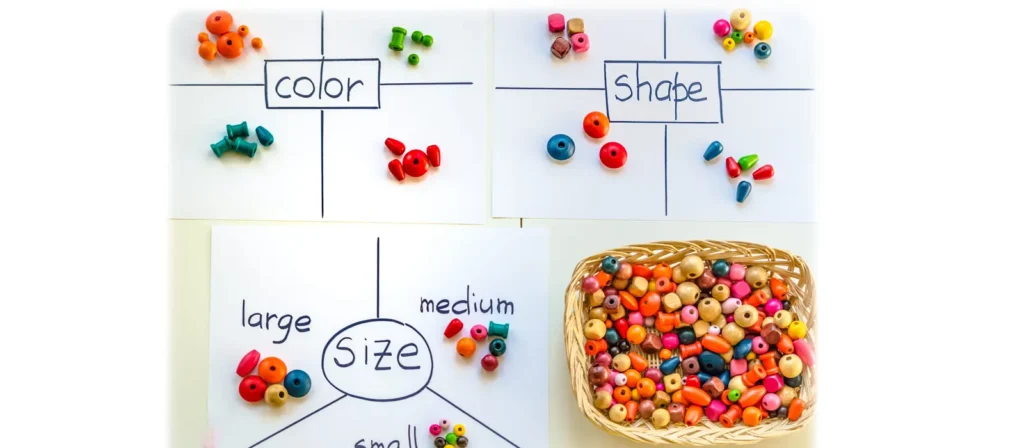
25. The Colorful Laundry Sort
Invite your little helper to turn a household chore into a vibrant game by grouping clean socks and clothes by color. Watching them excitedly match pairs or create piles of “sunny yellow” and “ocean blue” makes them feel like a valued part of the home. This routine teaches them that classification is a helpful, real-world skill that brings harmony to their environment.
26. Button Treasure Trays
Provide a wooden tray filled with assorted buttons and encourage your child to sort them by the number of holes, their texture, or their sparkle. This quiet, focused activity respects their autonomy as they decide which “rule” to follow for each group. It is a wonderful way to sharpen their eye for detail while strengthening the fine motor skills needed for future writing.
27. Nature’s Attribute Hunt
During a walk in the park, collect a variety of stones, leaves, and twigs to sort into “smooth,” “bumpy,” or “crunchy” categories. This sensory-rich experience connects mathematical logic to the natural world, showing children that everything in nature has a place where it belongs. It turns a simple stroll into a scientific exploration of the textures and shapes found in the great outdoors.
28. Muffin Tin Toy Sort
Transform a common muffin tin into a sorting station for small toy cars, animals, or building blocks. Challenge your child to fill each cup with items that share a single trait, such as “things with wheels” or “creatures with wings.” This structured yet playful task helps them understand that objects can be categorized in many different ways depending on how we look at them.
29. The Snack Time Shape Sort
Make healthy eating an educational adventure by inviting children to sort their crackers, fruit slices, or cereal into different-shaped bowls. Whether they are grouping “round” blueberries or “square” cheese cubes, they are exploring geometry through their senses. It’s a delicious way to show them that math is everywhere—even in the snacks that nourish their growing bodies.
Graphing Math Activities for Preschoolers
Graphing is a beautiful way for children to “see” math come to life through pictures and touch. It transforms abstract numbers into visual stories, helping preschoolers understand how different groups compare to one another. By creating simple charts together, we teach children how to organize information and find patterns, turning a collection of data into a clear and colorful map of their world.
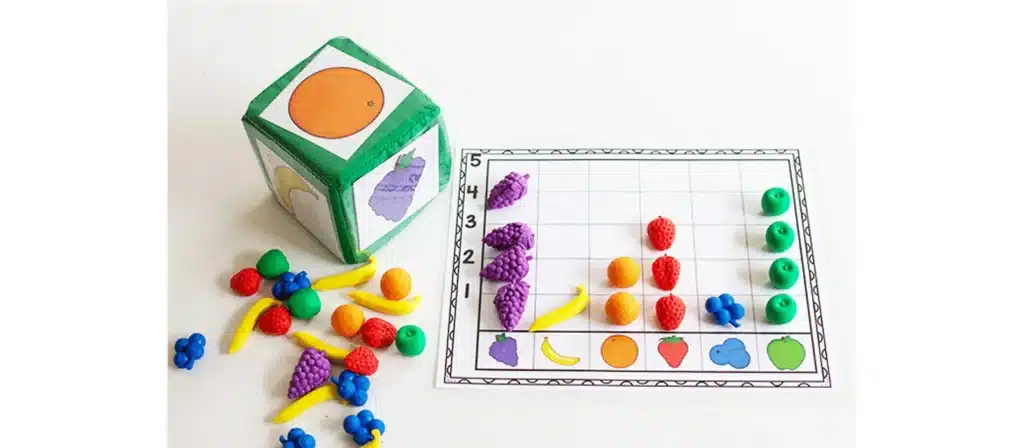
30. The Morning Weather Bar Graph
Start each day by looking out the window together and placing a sun, cloud, or raindrop icon on a large classroom chart. As the week unfolds, children can visually see which type of weather “won” the most days, creating a meaningful connection between the sky above and the math on the paper. It’s a gentle, daily ritual that teaches them how to track and compare the changing world around them.
31. Our Favorite Fruit Floor Graph
Lay out long strips of tape on the floor to create large columns and invite children to place their favorite snack(like an apple or a yellow banana) into the rows. Standing back to see which line is the tallest sparks wonderful conversations about “more” and “less” in a way they can physically walk through. This life-sized graph turns personal preferences into a shared mathematical celebration.
32. Shoe-Type Sorting Chart
Invite everyone to take a peek at their feet and group themselves into rows based on whether they are wearing sneakers, boots, or sandals. By standing in lines together, the children themselves become the “bars” of the graph, feeling the math through their own bodies and social connections. It is a joyful, active way to visualize data while celebrating the unique steps each child takes.
33. The Colorful Button Tally
Provide a jar of vibrant buttons and a simple grid, asking children to place one button in each square according to its color. Watching the columns of blue, red, and green grow side-by-side helps them understand one-to-one correspondence and visual height. It’s a quiet, focused activity that turns a pile of buttons into a clear picture of quantity and organized beauty.
34. Toy Animal Habitat Graph
Create a playful chart where children can place plastic animals into categories like “Land,” “Water,” or “Air” based on where they live. As the grid fills up with lions, dolphins, and birds, children learn to categorize complex information into a simple, readable format. This math activity blends a love for animals with the logic of graphing, making every discovery feel like a trip to the zoo.
Estimation Math Activities for Preschoolers
Estimation is one of the most creative parts of math, encouraging children to make bold, logical guesses without the pressure of being perfectly “right.” Through these “guess-timation” games, children learn to observe the scale of things and understand that math is a journey of exploration.
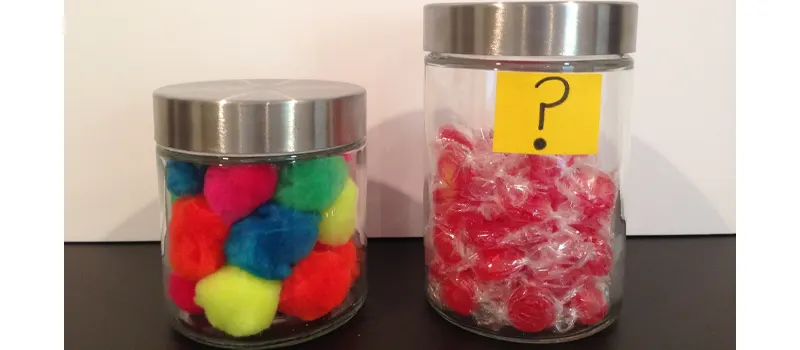
35. The “Guess the Jar” Challenge
Fill a clear jar with colorful pom-poms or dried pasta and invite your child to guess how many treasures are hiding inside before counting them together. This exercise builds an intuitive sense of quantity and “number magnitude” while creating a spark of excitement during the big reveal. Regardless of the guess, the joy lies in the discovery of the actual number.
36. Step Estimation Race
Before heading to the park or even just the front door, ask your child, “How many steps do you think it will take to get there?” Then, hold hands and count aloud as you walk together to see how close the guess was. This turns a simple transition into a thrilling mission, showing children that math exists in every step of their daily journey.
37. Heavy or Light Predictions
Before unpacking the groceries, let your child lift two different items to guess which one is “heavy” and which is “light.” They might be surprised to find that a small potato can feel heavier than a large, fluffy loaf of bread. This hands-on comparison builds a physical understanding of mass and helps them realize that size and weight are two very different stories.
Adding and Subtracting Math Activities for Preschoolers
At the preschool level, addition and subtraction are not about memorizing equations, but about the physical act of “composing and decomposing” groups of objects. By playing with their toys and snacks, children begin to understand the magic of how quantities change when we join them together or take them away. These math activities make the logic of arithmetic feel like a natural extension of their playtime story.
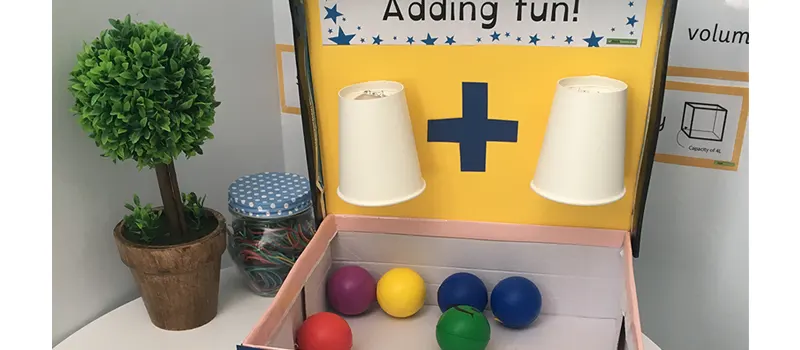
38. The Bowling Alley Countdown
Set up a few empty plastic bottles as pins and invite your little athlete to bowl them over with a soft ball. After the “strike,” count how many pins are still standing and how many were knocked down to see what is “left over.” This high-energy game turns subtraction into a thrilling physical victory, making the concept of taking away feel exciting and clear.
39. Five Little Ducks Pond Play
Create a “pond” using a blue cloth and use small toy ducks or yellow pom-poms to act out the classic counting rhyme. As each duckling “swims away” and eventually returns, your child can physically move the pieces to see the group grow and shrink. It is a heartwarming way to link storytelling and music to the foundational ebb and flow of addition and subtraction.
40. Greenhouse Seed Planting
Use an egg carton and some large dried beans to simulate a tiny garden where your child can “plant” seeds in the soil. Ask them to put two seeds in one hole and three in another, then count them all together to see how many flowers will grow. This tactile activity helps them visualize how two smaller groups combine to form a larger, more beautiful total.
41. Feed the Hungry Monster
Using a recycled box with a “monster” mouth, let your child “feed” it a specific number of snacks like blocks or pasta. After the monster eats some, open the box to see how many are left, or add more because the monster is still “hungry”. This playful interaction turns addition and subtraction into a caring story of friendship and fulfillment.
42. The “Plus-One” Stairs Challenge
Every time you walk up the stairs together, treat each step as a new addition problem by saying “plus one” as you climb. Start at zero and watch the number grow with every physical step your child takes toward the top. This simple routine links the physical sensation of ascending to the mathematical concept of increasing value, making every trip upstairs a triumph.
What Are the Benefits of Math Activities for Preschoolers?
Math activities provide numerous benefits for preschoolers, including enhanced cognitive development, fine motor skills, and problem-solving abilities. These math activities also promote social skills as children often work together in groups, learning to share and collaborate.
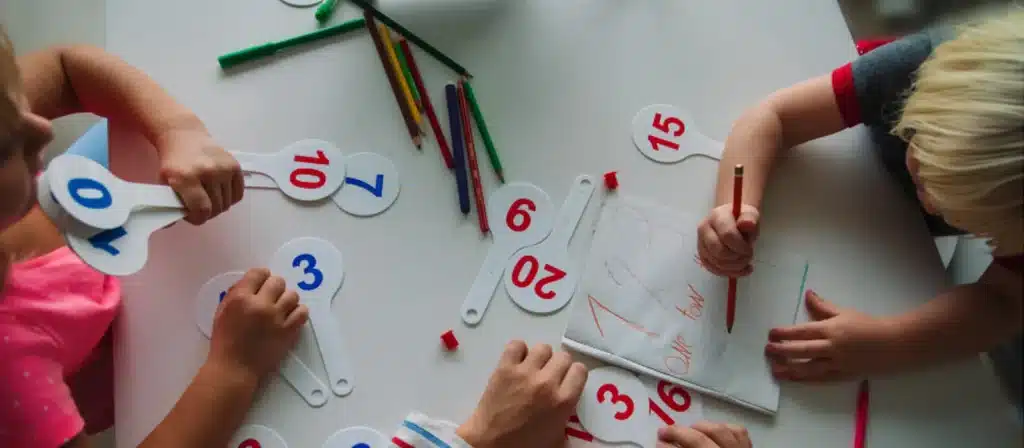
1. Improve Math Skills Through Play
Math activities improve basic skills and through play, children master basic math concepts in a fun and engaging way. Integrating math into everyday life and play makes learning easy and enjoyable, fostering a positive attitude toward the subject.
2. Introduce Basic Math Concepts in a Fun Way
Introducing basic math concepts through engaging activities makes learning enjoyable. Whether counting blocks or matching numbers with objects, these math activities capture children’s interest and make abstract concepts more concrete.
3. Enhancing Problem-Solving Skills
Math activities for preschoolers encourage children to think critically and solve problems. Whether counting blocks or solving puzzles, they are learning to approach problems methodically and find solutions.
4. Developing Fine Motor Skills
Activities like sorting, counting, and building with blocks help children develop fine motor skills. These math activities require precision and control, which are important for writing and using tools.
5. Fostering Independence
Math activities for preschoolers typically involve tasks children can complete independently or with minimal supervision. This develops a sense of independence and confidence to complete tasks and solve problems.

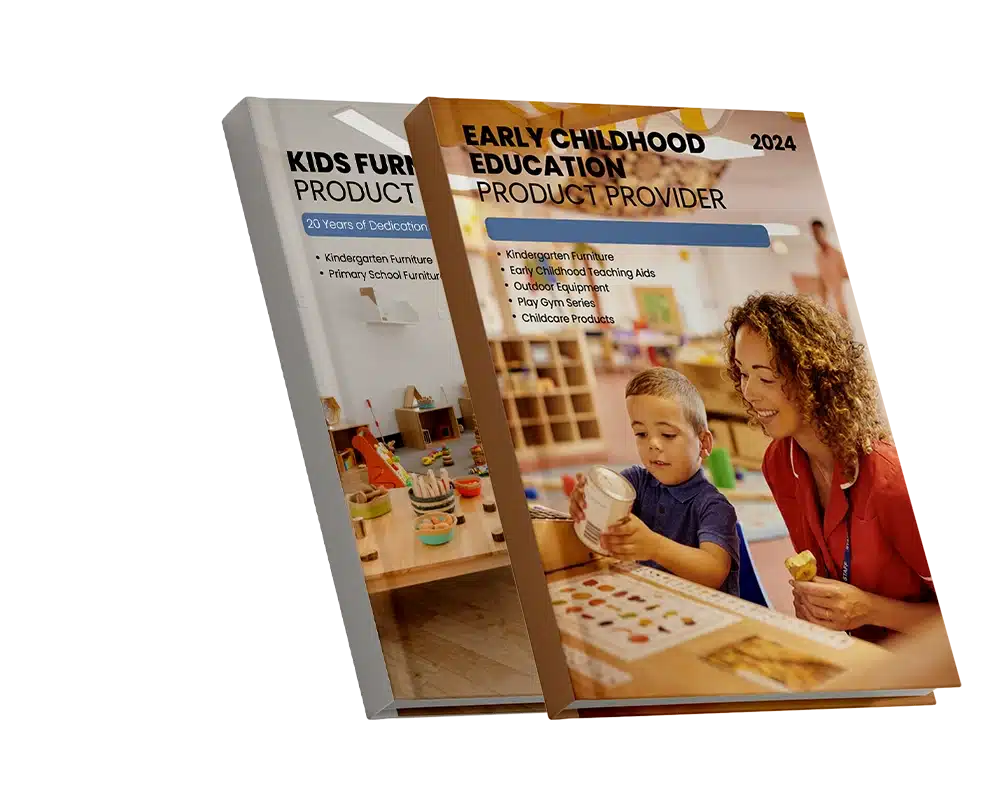
More Related Questions
How Can Parents Support Math Learning at Home?
Parents can support math learning at home by incorporating math into daily activities, such as cooking (measuring ingredients), shopping (counting items), and playing games that involve math skills. Encouraging a positive attitude toward math is also crucial.
What Role Do Teachers Play in Preschool Math Education?
Teachers play a vital role in preschool math education by providing various engaging math activities, creating a supportive learning environment, and encouraging children to explore and enjoy math. They can tailor activities to meet each child’s developmental level and interests.
How Can Technology Be Used to Teach Math to Preschoolers?
Technology can be used to teach math to preschoolers through educational apps, interactive games, and online resources that provide engaging and interactive math activities. These tools can make math learning more dynamic and accessible.
What Are Some Tips for Creating a Math-Friendly Environment?
Creating a math-friendly environment involves providing access to math materials (blocks, shapes, counting tools), displaying numbers and shapes around the room, and incorporating math language into everyday conversations. Encouraging exploration and curiosity is key.
Conclusion
Incorporating these preschool math activities into everyday life can make learning fun and engaging for preschoolers. Various hands-on experiences can foster positive attitudes toward math from an early age.
If you would like to learn more about resources for preschoolers or would like to purchase furniture for your kindergarten classroom, you can contact Xiha Montessori.

